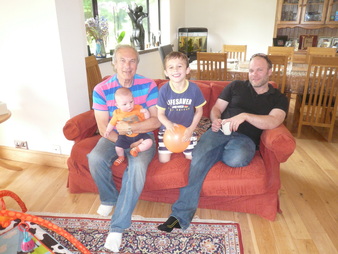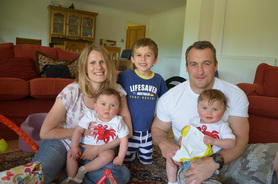
From an ecological perspective we might reflect on how our family functions and adapts to assure survival, how we collectively try to improve the quality of our lives, and how we contribute to sustaining natural resources. We might also consider how we allocate and manage resources over time to meet the changing needs of individuals and the family as a group. And how the environment (the meso-, exo-, and macrosystems of which we are apart impact on us.
Scanning my blog I can see many references to our family and the ecology that sustains it and how the members of my immediate and the greater family impact on my life. For example, in my last blog I talked about my step nephew's search amongst family members for resources to enable him to finance some training to help him become a missionary both my wife and I have responded to him with financial and emotional help and he in return is coming to visit us in a couple of weeks.
This week has also been half term so I had the pleasure of looking after my six year old grandson for 24 hours. I have been very conscious since the twins have been born that I have spent less time with him and this sleepover, and the things we did together, were an important way in which we renewed our bonds. As we parted he said (as he so often does) 'I love you ganddad', which gets right to the point of good family relationships.
Last Tuesday I, and my wife helped my daughter with childcare looking after all three of her children so that she could go to work. I suppose this is an example of family ecology in action to help sustain the family and enable resources to be brought into the family.
During the week my wife and I chatted at length to our two children at university listening to their problems (prep for exams and an important piece of coursework). They discussed their ideas for their future and we provided encouragement and practical suggestions where we could. Thanks to technology and mobile phones even when we are not physically together as a family we can remain in touch and have valuable conversations that sustain our family ecology.
Making full use of our physical environment, yesterday my wife took me and our daughter out for a light and chilly (we sat outside) lunch and after cleaning the house and working in the garden (maintaining our physical environment) we had some fun and went to the cinema to see The Great Gatsby. This morning I was made to jump on the scales to see how much I weighed fortunately I hadn't had any breakfast. I then proceeded to set the scales to give me my BMI. She had been reading a book about fasting and she passed on the science she had learnt on to me. The experience of public weighing and telling me that I was nearly obese was also intended to convince me that I needed to do something about it - the family ecology of nurturing our health and educating me was clearly in evidence.

And as I complete this piece my daughter who is over from Dubai for a few days is staying with us. Last night we spent time catching up and talking a lot about a particular matter involving another member of the family. I was struck by her deep concern and her willingness to provide both practical help and emotional support.
These simple stories of family life in the past week reflect the everyday functionings of our family. A family I am very proud of. Each example illustrates the ecology that binds us together and gives us an important part of our identity and our sense of individual and social wellbeing. But these sorts of ecologies are learned. The values, attitudes and behaviours that underpin such ecologies are passed on from generation to generation propagated by parents who teach their children the importance of these things. I know that I and both of my wives learnt the meanings of family from growing up in our respective families and we have simply tried to practice the values and practices that were passed on to us through these lived experiences. I can no see the same patterns emerging as my children and step children find their own independent way in the world.
1) I found this powerpoint presentation which provided the core ideas for the ecology of family www.public.iastate.edu/~hd_fs.511/lecture/Sourcebook17.ppt
Bubolz, M. M., & Sontag, M. S. (1993). Human ecology theory. In P. G. Boss, W. J. Doherty, R. LaRossa, W. R. Schumm, & S. K. Steinmetz (Eds.), Sourcebook of family theories and methods: A contextual approach (pp. 419-448). New York: Plenum Press.




 RSS Feed
RSS Feed